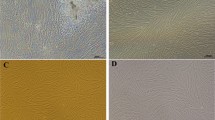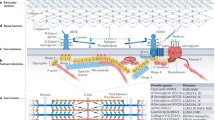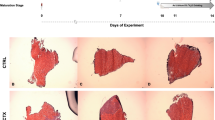Abstract
DURING the past few years, several laboratories1–8 have reported that the activities of many of the acid hydrolases of skeletal muscle are greatly increased in wasting diseases from different causes. Although the progressive loss of muscle mass in these conditions is generally attributed primarily to this enhanced activity of the acid hydrolases, there is little direct experimental evidence in support of this hypothesis. Furthermore, other enzymes involved in protein catabolism, such as alkaline protease6 and peptidases9, have been shown to be elevated in dystrophic muscle. The normally low levels of these enzymes in skeletal muscle and the limited knowledge of their substrate specificities have hindered a better understanding of the mechanism of the wasting process.
This is a preview of subscription content, access via your institution
Access options
Subscribe to this journal
Receive 51 print issues and online access
$199.00 per year
only $3.90 per issue
Buy this article
- Purchase on SpringerLink
- Instant access to the full article PDF.
USD 39.95
Prices may be subject to local taxes which are calculated during checkout
Similar content being viewed by others
References
Weinstock, I. M., Goldrich, A. D., and Milhorat, A. T., Proc. Soc. Exp. Biol. and Med., 88, 257 (1955).
Weinstock, I. M., Epstein, S., and Milhorat, A. T., Proc. Soc. Exp. Biol. and Med., 99, 272 (1958).
Zalkin, H., Tappel, A. L., Caldwell, K. A., Shibko, S., Desai, I. D., and Holliday, T. A., J. Biol. Chem., 237, 2678 (1962).
Tappel, A. L., Zalkin, H., Caldwell, K. A., Desai, I. D., and Shibko, S., Arch. Biochem. Biophys., 96, 340 (1962).
Pellegrino, C., Villani, G., and Franzini, C., Arch. Sci. Biol. (Bologna), 41, 339 (1957).
Koszalka, T. R., Mason, K. E., and Krol, G., J. Nutrition, 73, 78 (1961).
Weinstock, I. M., and Lukacs, M., Proc. Soc. Exp. Biol. and Med., 115, 716 (1964).
Hajek, J., Gutmann, E., and Sytovy, I., Physiol. Bohemoslov, 13, 32 (1964).
Weinstock, I. M., Goldrich, A. D., and Milhorat, A. T., Proc. Soc. Exp. Biol. and Med., 91, 302 (1956).
Iodice, A. A., and Weinstock, I. M., Fed. Proc., 23, 544 (1964).
Press, E., Porter, R. R., and Cebra, J., Biochem. J., 74, 501 (1960).
De Duve, C., in Subcellular Particles, 128 (Ronald Press, New York, 1959).
Fruton, J. S., and Bergmann, M., J. Biol. Chem., 130, 19 (1939).
Goettsch, M., and Pappenheimer, A. M., J. Exp. Med., 54, 145 (1931).
Asmundson, V. S., and Julian, L. M., J. Hered., 47, 248 (1956).
Moore, S., and Stein, W. H., J. Biol. Chem., 211, 907 (1954).
Lowry, O. H., Rosebrough, N. J., Farr, A. L., and Randall, R. J., J. Biol. Chem., 193, 265 (1951).
Author information
Authors and Affiliations
Rights and permissions
About this article
Cite this article
IODICE, A., WEINSTOCK, I. Cathepsin A in Nutritional and Hereditary Muscular Dystrophy. Nature 207, 1102 (1965). https://doi.org/10.1038/2071102a0
Published:
Issue date:
DOI: https://doi.org/10.1038/2071102a0



